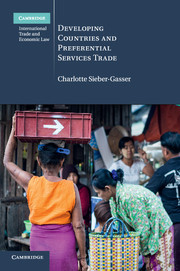Description
Developing Countries and Preferential Services Trade
Cambridge International Trade and Economic Law Series
Author: Sieber-Gasser Charlotte
A discussion of the flexibility in WTO law for developing countries and how it can be used to their economic advantage.
Language: English
Subject for Developing Countries and Preferential Services Trade:
Approximative price 28.98 €
In Print (Delivery period: 14 days).
Add to cart
Developing Countries and Preferential Services Trade
Publication date: 06-2018
Support: Print on demand
Publication date: 06-2018
Support: Print on demand
Approximative price 111.55 €
In Print (Delivery period: 14 days).
Add to cart
Developing Countries and Preferential Services Trade
Publication date: 07-2016
Support: Print on demand
Publication date: 07-2016
Support: Print on demand
Description
/li>Contents
/li>Biography
/li>
WTO law sets the global minimum standards for trade regulation, while allowing some regulatory flexibility for developing countries. The exact scope of regulatory flexibility is often unclear and, at times, flexibility may be counterproductive to sustainable economic growth in developing countries. Undisputedly, developing countries would have some flexibility with respect to tailoring preferential services trade agreements to their individual economic needs and circumstances, but empirical data from over 280 preferential services trade agreements worldwide shows that this flexibility is rarely used. This volume clarifies the regulatory scope of flexibility for preferential services trade agreements between developing countries by linking the legal interpretation of WTO law with evidence from research in economics and political sciences. The book suggests that the current regulatory framework leaves room for meaningful flexibility for developing countries, and encourages policymakers and scholars to take these flexibilities into consideration in their design and study of trade policies.
Foundations; 1. Special and differential treatment in the WTO; 2. The rationale for South-South services trade; 3. The quest of this study; Part I. Preferential Services Trade: 4. History and geography of preferential services trade; 5. Stock-taking of preferential services trade agreements; 6. The current level of liberalisation; 7. The special case of South-South preferential services trade; Part II. Legal Regime for Preferential Services Trade: 8. Historical background of preferentialism in services trade and its regulation; 9. GATS Art. V; 10. Regulatory flexibilities in the GATS: special and differential treatment; 11. Compliance with GATS worldwide; 12. Loopholes in the GATS: problems in practice; 13. Innovation in South-South agreements?; 14. In summary; Part III. Legal Regime for South-South Preferential Services Trade: 15. The legal scope of flexibilities for South-South preferential services trade; 16. Legal arguments for a large scope of flexibilities in the GATS; 17. New approach to a better use of the scope of flexibilities; 18. Systemic considerations; 19. In summary; Part IV. Conclusions: 20. Lessons for the WTO; 21. Lessons for the architecture of international economic law; 22. Critical issues for future research.
Charlotte Sieber-Gasser studied law in both Bern and Fribourg, Switzerland, and development studies in Manchester. She currently works as a Senior Visiting Research Fellow at the Graduate Institute for International and Development Studies in Geneva, and as a Lecturer in Law at the University of Bern, Switzerland.
© 2024 LAVOISIER S.A.S.




